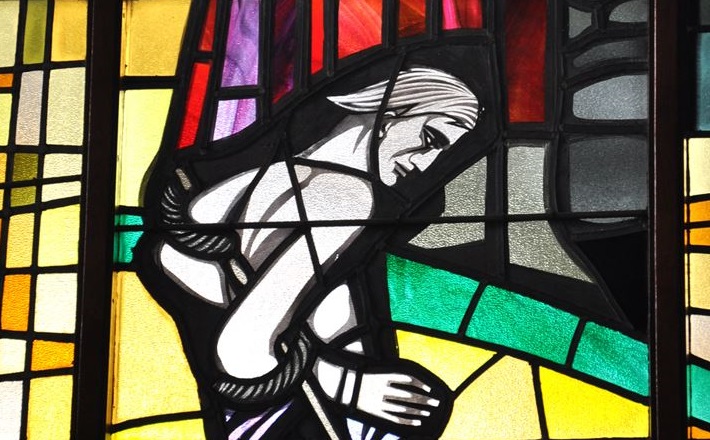Commentary on 2 Corinthians 4:13—5:1
These verses in Paul’s second letter to the Corinthians bring into perspective significant characteristics of a life lived from faith.
Paul literally embodies what such a life looks like and what a participation in Christ means for the one who believes and he is not afraid to argue from his experience. These verses also highlight one of the ways Paul exegetically approaches the Old Testament and, in this case, the psalms.
In the opening verse of this passage, Paul cites Psalm 116:10. The whole verse from the Septuagint reads, “I believed, therefore I have spoken: but I was greatly afflicted.” Paul has again been arguing his right as an apostle and defending the authenticity of his call. The fact that he suffers, the reality of defeat and despair, his weakness (all summed up famously in the “but not’s” of the preceding verses, “We are afflicted in every way, but not crushed; perplexed, but not driven to despair; persecuted, but not forsaken; struck down, but not destroyed … ” 2 Corinthians 4:8-12), this affliction does not negate or invalidate his proclamation but in fact points to the very gospel he preaches.
Paul’s affliction is not a diminishment of the Gospel. Being able to speak in the midst of affliction is itself a critique of all the superficial criteria of success that rules in the church of Corinth (and in many others as well!). Perfection or success is not to be defined by the world (that will always define it culturally) but by the Spirit who works in and through clay jars (2 Corinthians 4:7), broken vessels.
What is more, the “witness” of these clay jars or broken vessels is found throughout Scripture. Paul turns to the psalms, to the cry of the believers found in the psalms. He turns to their dialogue and argument with God and finds in his own life, in his own experience of faith, “the same spirit of faith.” It is this solidarity, this mystery of a communion in the same spirit of faith that renders his preaching and proclamation authentic and spirit-filled.
In other words, Paul’s speaking is true because he is in the same spirit as the Scripture. The psalmist’s heart (the psalmist’s whole experience of faith) is not only shared but is the same now in Paul. The truthfulness of his preaching is in this “sameness.” The gospel that Paul proclaims is then not about himself, Paul, but points to the other. Preaching points not to the preacher but to Christ, to the same spirit of faith, and through Christ to the community and the neighbor.
Paul and the psalmists are participants in one faith. Whose faith? The faith of Christ! This is particularly significant. The one who grounds this unique participation in faith between Paul and the psalmist (between the preacher and the communion of saints) is God through Jesus Christ and in Christ’s Spirit, “the same spirit.” The faith that we know through Jesus Christ and in which we participate through the Holy Spirit is a faith not found in ourselves, or through our own effort. It is a faith outside of us, a faith that the Holy Spirit awakens, nourishes and strengthens within us. It is the faith of Christ, who himself was afflicted unto death, broken, despised and, in the eyes of the world, singularly unsuccessful.
Psalm 116 is read christologically and ecclesially. Paul understands that speaking is possible only because of this faith. It must be noted that the noun “faith” and the verb “to believe” have the same root in Greek — pistis. Speaking arises out of “faith-ing.” Proclamation is rooted in the faith of Christ, not in any particular ability or gift that the preacher might have, not in any superior virtue or success. As such, speaking (preaching) points not to my own faith, nor to an individual faith not even to an effort to believe, but only to the one who engenders this faith.
David Frederickson points out (Word and World, 11/2, 1991), “Paul grounds speech in belief rather than in social position or moral virtue.” Only faith — not who we are, not our successes or giftedness or influence or power — but only faith establishes this radical “freedom” of speech that can proclaim the Gospel in and out of season, despite all hindrances.
The reality of faith is communal. When Paul calls on the psalmist to witness to Paul’s own faith, Paul already acknowledges this communality. Nor does Paul exclude the community from the relationship. Through his preaching, the community at Corinth is also part of this faith. Faith extends to include all. The community too is being raised with Jesus, in the presence of one another despite the signs of “outer nature” that tend to burden the community, the inner nature is renewed in a deep hope, a hope communally shared with all believers.
A sign of this renewal is thanksgiving. As grace increases, as more and more participate in the same faith, so does thanksgiving increase. Paul traces in these few verses the whole journey of a community of believers. The journey with Christ, through descent to ascent, through death to life, marks or identifies the Christian community. In the midst of affliction, they still gather and give thanks. In fact the journey culminates in the thanksgiving of the meal, when the cup of salvation is lifted up (Psalm 116:13 — this psalm is used liturgically on Maundy Thursday.)
In the Genesis story coupled with this text from 2 Corinthians in the Revised Common Lectionary, we see the opposite movement. Adam and Eve hide from the presence of the Lord. Their disbelief has isolated them, taken them out of a communion with God. They cannot speak. But those that do the “will of God” (Mark 3:35), often without even knowing they are doing it, walk in the presence of the Lord. They live the gospel. They are mother, brother, sister — part of a new community, sharing the same faith.


June 7, 2015